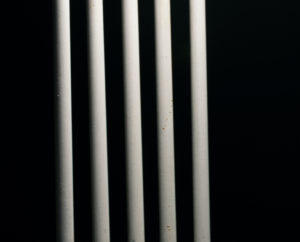
Many sudden leaks your Houston plumber sees are due to polybutylene pipes. These pipes were commonly placed in homes from 1978 to 1995. However, they caused many problems for homeowners. Between six million and ten million houses in the U.S. had polybutylene plumbing installed during this time. However, only a fraction of homes with polybutylene plumbing replaced their pipes with more appropriate materials. Many homeowners today may still have polybutylene pipes without knowing it. Consider talking to your Houston plumber if you have polybutylene plumbing. These pipes have many disadvantages.
What are Polybutylene Pipes?
Many in the ’70s, ‘80s, and ’90s considered polybutylene a wonder material for piping. This plastic doesn’t crack under pressure. Also, it is flexible and resists substances like acids, alcohol, and fats. Another thing people loved about these pipes is that they offer less noise transmission.
Therefore, many people saw it as the wave of the future when it came to plumbing. However, these pipes only have a service life of about 10 to 15 years. Additionally, they deteriorate from the inside out, which means that they may burst without any warning. In these cases, you need your Houston plumber to come out and fix the damage as soon as possible to avoid major water damage to your home. Because of how difficult it is to detect polybutylene pipe deterioration, most homes built since 1995 use different plumbing materials.
How Will My Houston Plumber Tell if I Have Polybutylene Plumbing?
Unfortunately, many homeowners aren’t aware that they have polybutylene pipes until a plumbing emergency occurs. While many know about the issues with this material for plumbing, it can be difficult to spot if you don’t know what to look for. Also, even if you had a home inspection before purchasing your house, the inspector is under no obligation to let you know that it features polybutylene plumbing. An inspector also doesn’t need to test the pipes for weak areas, because it requires turning off the water, dismantling the pipes, and looking for deterioration.
So, how will you know if you have polybutylene pipes? Your Houston plumber can check for you and help you determine the best course of action. Polybutylene can look a lot like PVC. However, these are not the same kinds of pipes. Polybutylene pipes are always stamped with a “PB” followed by numbers.
The most common place to find PB pipes include:
- Water heater supply lines
- Sink, toilet, and bathtub supply pipes
- Water meter pipes
- Pipes near the shut off valve
Also, these pipes frequently have copper fittings, which often leads homeowners to believe their pipes are made of another material. However, they inevitably find out that they are polybutylene when they experience plumbing issues.
Dangers of These Pipes
Polybutylene pipes can rupture suddenly and without warning because they deteriorate from the inside out. This is a common issue that your Houston residential plumber sees with PB plumbing. However, these pipes can also cause slow leaks that are difficult to detect. This may lead to drywall deterioration, mold growth, and major water damage in your home.
As we mentioned, it’s difficult to determine when your PB pipes are nearing the end of their service life or if they’re deteriorated, as it requires dismantling your plumbing. Also, there is no way to repair polybutylene pipes, you can only replace them.
Deteriorating polybutylene pipes can also pose a risk to your water quality. As these pipes corrode, they develop a scale. This scale can then flake off into your water, which can negatively impact the water quality in your home.
Finally, even if you’re not concerned about large plumbing issues or flaky pipes, these pipes can also cause other issues. For example, many mortgage lenders require pipe replacement for polybutylene plumbing before you can buy, sell, or refinance. Also, polybutylene plumbing can affect your homeowners insurance. In some cases, insurance companies will deny or even cancel homeowners insurance policies if they discover the home has polybutylene plumbing. Even if you’re able to keep your insurance policy, you may be paying a higher premium. The policy may also not cover any plumbing issues or water damage from broken pipes. Therefore, it’s better to replace this type of plumbing before you run into problems.
When Should I Call My Houston Plumber?
If you have an older home that you suspect has polybutylene plumbing, you may want to schedule an inspection with your Houston residential plumber. Your plumber will be able to tell you whether you have this piping and help you create a plan for what to do next. Because it is nearly impossible to tell if your polybutylene pipes are nearing the end of their service life, it may be best to replace your plumbing before it fails. This is especially true in areas with high chlorine levels in the water, chlorine levels are linked with polybutylene pipe failure.
If you discover a leak before your inspection, you should keep an eye out for other sudden leaks. Many people have replaced one failed polybutylene pipe only to discover that another one burst shortly after. Therefore, after a polybutylene pipe bursts, it’s likely a good idea to replace all your plumbing with more durable materials, as oftentimes after one pipe starts to leak, another leak or rupture is just around the corner.
Working with your Houston plumber to replace your polybutylene plumbing can help you avoid expensive emergency repairs later. Additionally, replacing your pipes before they begin to leak can help you avoid extensive water damage in your home which can lead to rot and mold growth. Therefore, call an experienced plumbing company for help if you believe your home has PB pipes.
At Santhoff Plumbing Company, we are a leading plumber in Houston. Our experts help you with installation, Houston broken pipe repair, and replacement for your residential and commercial plumbing systems. We have been serving Houston since 1974 and have the experience you need. Call us today at (713) 665-4997 to discuss your plumbing needs with our professionals. We are here to serve you!

